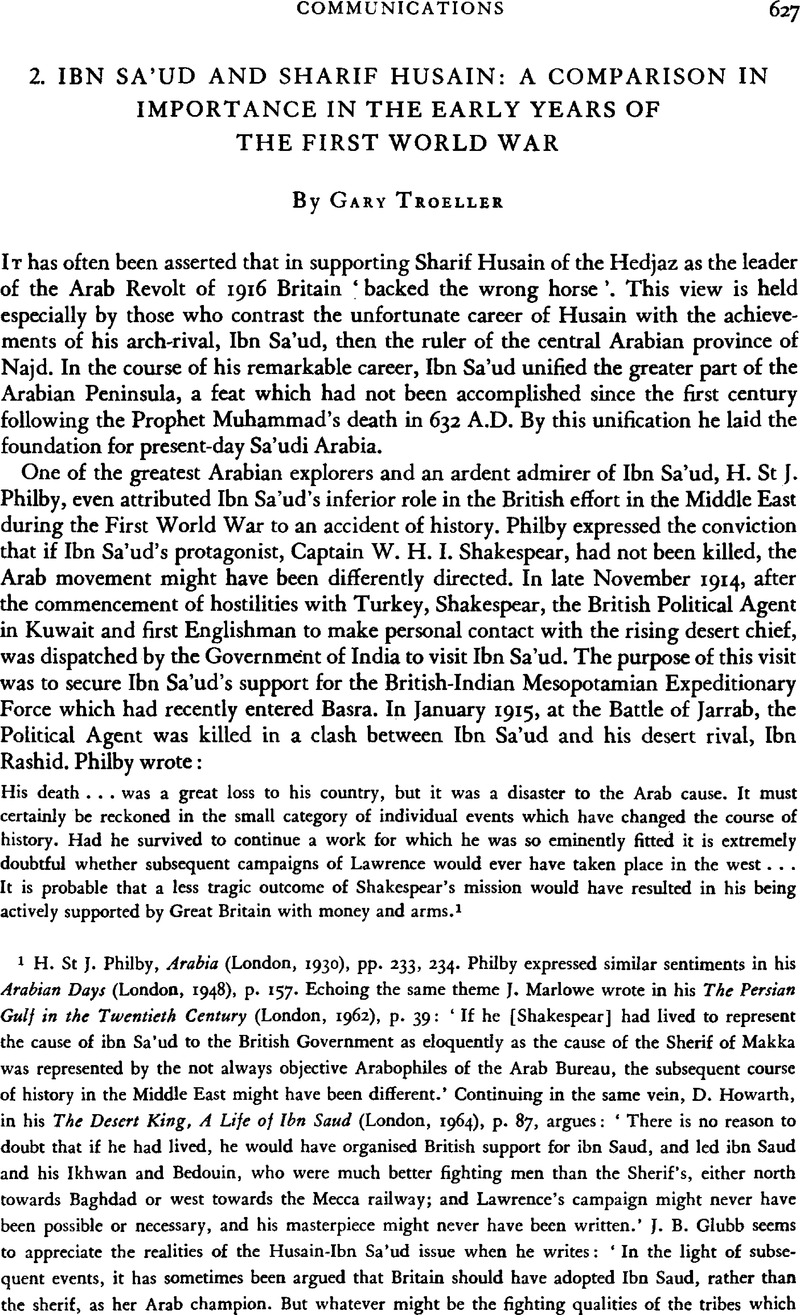Published online by Cambridge University Press: 11 February 2009

1 Philby, H. St J., Arabia (London, 1930), pp. 233, 234.Google Scholar Philby expressed similar sentiments in his Arabian Days (London, 1948), p. 157.Google Scholar Echoing the same theme Marlowe, J. wrote in his The Persian Gulf in the Twentieth Century (London, 1962), p. 39:Google Scholar ‘If he [Shakespear] had lived to represent the cause of ibn Sa'ud to the British Government as eloquently as the cause of the Sherif of Makka was represented by the not always objective Arabophiles of the Arab Bureau, the subsequent course of history in the Middle East might have been different. ‘Continuing in the same vein, Howarth, D., in his The Desert King, A Life of Ibn Saud (London, 1964), p. 87Google Scholar, argues: ‘There is no reason to doubt that if he had lived, he would have organised British support for ibn Saud, and led ibn Saud and his Ikhwan and Bedouin, who were much better fighting men than the Sherif's, either north towards Baghdad or west towards the Mecca railway; and Lawrence's campaign might never have been possible or necessary, and his masterpiece might never have been written.’ J. B. Glubb seems to appreciate the realities of the Husain-Ibn Sa'ud issue when he writes: ‘In the light of subsequent events, it has sometimes been argued that Britain should have adopted Ibn Saud, rather than the sherif, as her Arab champion. But whatever might be the fighting qualities of the tribes which acknowledged Ibn Saud as their leader, his assistance would have been of little value to counteract the call to holy war, which exercised the minds of the Allied leaders in 1914 and 1915.’See his Britain and the Arabs (London, 1959), p. 59. Curiously, on the following page he appears to revert to a view consonant with those given above when he notes: ‘If Shakespear had survived and remained with Ibn Saud, the course of history might well have been different …’ (p. 60).Google Scholar
2 The British oilfield in south-west Persia, 130 miles north-east of Mohammera, was of special interest to the Admiralty. By the outbreak of war with Turkey ‘25,000 tons of oil per month were … being exported from the new oil fields in south Persia ’. See Monroe, Elizabeth, Britain's Moment in the Middle East (London, 1963), p. 25.Google Scholar
3 As will be obvious to students of the Middle East, it is difficult when dealing with the Muslim East of fifty years ago to separate religious from political considerations. Because of the fundamentally theocratic nature of Islam, religion and politics are in many cases inextricably intertwined.
4 Young, Hubert, The Independent Arab (London, 1933), p. 271.Google Scholar
5 Antonius, G., The Arab Awakening (London, 1955), p. 135.Google Scholar
6 See Kedourie's, E. essay ‘Cairo and Khartoum on the Arab Question’ in his The Chatham House Version and other Middle Eastern Studies (London, 1970), p. 16.Google Scholar
7 Ibid. For this controversy and an analysis of British relations with Husain from 1914 to 1918, Kedourie's article offers some penetrating insights.
8 Glubb, J. B., Britain and the Arabs (London, 1959), p. 58.Google Scholar
9 Ibid.
10 Wingate to Lord Hardinge (the Viceroy of India), 26 Aug. 1915, in the Wingate Papers (hereafter W.P.), School of Oriental Studies, Durham University, File 139/6, quoted in Kedourie, , op. cit. p. 17.Google Scholar
11 Committee of Imperial Defence, Historical Summary of Events in Territories of the Ottoman Empire, Persia and Arabia affecting the British Position in the Persian Gulf, 1907–1928; L/P & S/18, p. 274 A. (India Office.)
12 Monroe, , op. cit. pp. 11, 12.Google Scholar
13 SirBarrow, Edmund, military secretary of the India Office, put forth this view in a minute written on 26 Sept. 1914.Google Scholar See Zeine, Z. N., Arab Turkish Relations and the Emergence of Arab Nationalism (Beirut, 1958), p. 98.Google Scholar
14 In late January 1915, a Turkish force numbering 25,000 marched on the canal zone. By 5 February, this expedition had been defeated.
15 W.P. 141/4, quoted in Kedourie, , op. cit. p. 16.Google Scholar
16 SirBullard, R., Britain and the Middle East (London, 1951), p. 76.Google Scholar
17 Ibid. p. 77.
18 Ibid. p. 78.
19 Longrigg, S. H., Iraq, 1900 To 1950 (London, 1953), pp. 18, 24, 25 and 37.Google Scholar See also Glubb, , op. cit. p. 125.Google Scholar
20 Glubb, , op. cit. p. 125Google Scholar
21 Marlowe, J., The Persian Gulf in the Twentieth Century (London, 1962), p. 43.Google Scholar
22 Antonius, , op. cit. p. 140.Google Scholar
23 For Ibn Sa'ud's tribal difficulties, see Memorandum on Relations Between the Ajman and the Recent History of the Latter, 25 July 1916, no. 3508; L/P & S/10, 2182/1913, pts. 4, 5 (India Office); Memorandum on Relations with Ibn Sa'ud, Jan. 1917, no. 1458/35392; F.O. 371/3044 (Public Record Office); and Philby's Najd Report, no. 122; L/P & S/10, 2182/1913, pts. 9, 10 (India Office).
24 Antonius, , op. cit. p. 138.Google Scholar
25 Young, , op. cit. p. 273.Google Scholar
26 Hogarth, D. G., ‘Wahhabism and British Interests’, Journal of the British Institute of International Affairs, IV (1925), 72.Google Scholar